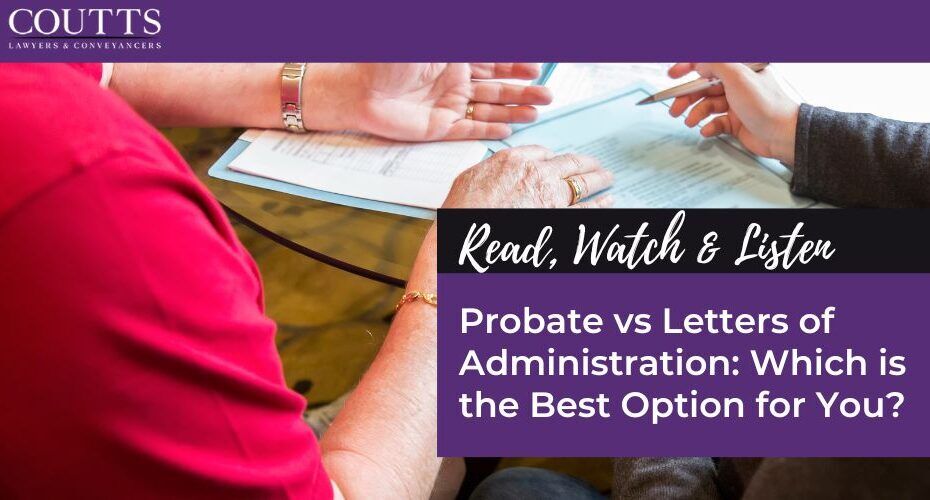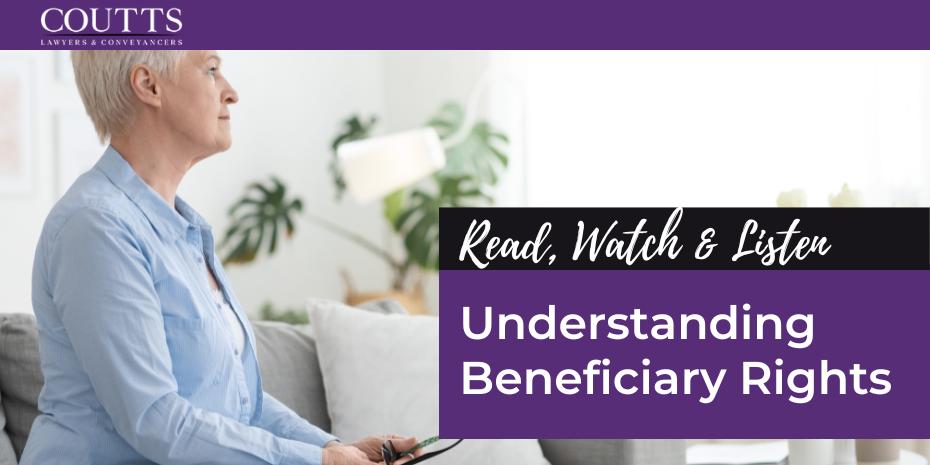KEY TAKE-OUTS:
- Probate or Letters of Administration is NOT a choice.
- Probate applies when there is a Will.
- Letters of Administration applies when there is not a Will.
Many people have heard of the terms “Probate” and “Letters of Administration” and know that it refers to a process which occurs after a person’s death. Few people however actually know what that process is and the difference between the two terms.
Whether you obtain a Grant of Probate, or a Grant of Letters of Administration is NOT a choice. They are two documents which do the same job but for different reasons.
Grant of Probate
A Grant of Probate is the document granted by the Supreme Court in New South Wales, authorising the executor appointed in a deceased’s Will to manage the deceased person’s estate.
Not all estates will require a Grant of Probate to be obtained by the executor.
Whether a Grant of Probate is required depends on what assets the deceased held at the time of their death.
If the deceased only had assets jointly with another for example, their spouse, then a Grant of Probate will not be required.
Jointly Held Assets
Jointly held assets pass to the joint owner by way of survivorship not the deceased’s Will. Paperwork is still required to be completed to change the ownership from joint names to the survivor’s sole name, but a Grant of Probate is not required.
Solely Held Assets
If, however, the deceased person held an asset in their sole name or as tenants in common with another (i.e., the deceased held a distinct share in the asset rather than jointly), whether probate is required will depend on the requirements of the holder of the asset.
Common examples of when Probate will be required in New South Wales
- If the deceased person held real estate property in their sole name (or as a tenant in common with another) the NSW Land Registry will require the executor to obtain Probate prior to the executor transferring the real estate property to the recipient named in the Will or selling the real estate to a third party.
- If a deceased person had a bank account with more than $50,000, it is likely that the bank will request that the executor obtain a Grant of Probate before releasing the monies held in the deceased’s account. Often a building society has a lower threshold amount than a bank, which can be as low as $15,000.
- If a deceased person holds shares in their name, whether Probate is required will depend on which share registry the shares are held on. For example, Link Market Services share registry requires Probate where the value of the shares is more than $15,000, whereas the Computershare Registry only requires Probate if the shares are over $50,000.
- If a deceased person paid a refundable accommodation bond (RAD) on entry into a nursing home, it is usual that the care home provider will require the production of a Grant of Probate prior to the release of the RAD to the executor.
How do you obtain a Grant of Probate?
Before being able to apply for a Grant of Probate, the executor must advertise their intention to apply for a Grant of Probate on the Supreme Court Probate Registry website. This is a public record which can be searched. Anyone who has a claim on the deceased estate, such as a person or organisation owed money by the deceased, can send details of their claim to the executor to request that the amount owed be repaid from the deceased’s estate.
The Notice placed by the executor must remain on the record for at least 14 days before the executor applies for Probate.
An application for Probate involves the executor swearing an Affidavit to confirm that as far as they are aware, the Will of the deceased they are producing to the Supreme Court for Probate is the deceased person’s last Will and there is no later Will or document setting out the deceased’s wishes.
The Affidavit has an attachment called the Inventory of Property which sets out particulars of all the assets that the deceased holds in their sole name or as tenants in common with another, together with the known or estimate value of the assets.
If satisfied that the Will is the last Will of the deceased, the Court will make an order called the Grant of Probate.
The executor sends a copy of the Grant of Probate to each of the asset holders such as, the Land Registry, share registry or the bank, as proof of the executor’s authority to deal with the asset as directed in the Will.
Letters of Administration
If the deceased person did not leave a Will, the person is said to have died “intestate” and the rules of intestacy contained in the NSW Succession Act 2006 will apply.
The rules of intestacy set out a predetermined order of who inherits the deceased person’s assets.
The person entitled to receive the deceased’s assets is also the person entitled to apply to administer the estate on behalf of the deceased person, as an executor does when there is a Will. This person is known as the administrator.
There may be more than one person who is entitled on intestacy to apply for a Grant of Letters of Administration. If so, all those entitled to apply must apply to be appointed as administrators. If one of the entitled persons does not want to apply they can consent to the other entitled persons applying without them.
A Grant of Letters of Administration is the document granted by the Supreme Court in New South Wales, authorising this entitled person/s to manage the deceased person’s estate.
As with a Grant of Probate, not all estates will need a Grant of Letters of Administration. If there are jointly held assets or assets with minimal value, a Grant of Letters of Administration will not be required.
How do you obtain a Grant of Letters of Administration?
Like a Grant of Probate, the administrator of the estate must advertise their intention to apply for Letters of Administration on the Supreme Court Probate Registry website at least 14 days prior to applying for the Grant of Letters of Administration.
The Administrator must swear an Affidavit confirming that as far as they are aware, the deceased did not leave a Will or any other document which sets out the deceased’ person wishes on death.
Will Searches
The administrator must set out in the Affidavit what searches they have undertaken to locate a Will. These searches must include:
- Checking with solicitors local to the deceased,
- With the New South Wales Trustee and Guardian,
- The deceased banks and
- Searching the deceased’s personal possessions and papers.
Proof of entitlement on intestacy
The Administrator must also set out in the Affidavit how they meet the criteria of being the person entitled pursuant to the rules of intestacy. Certificate evidence must be attached to prove the relationship such as marriage or birth certificates.
In the case of a de facto relationship which cannot be proven by a certificate (unless the relationship is registered), an Affidavit must be sworn to state that the person was living with the deceased continuously for the two years prior to death (unless the person has had a child with the deceased and the two-year period is not required).
If the court is satisfied that the person applying is the person eligible under the rules of intestacy the Court will make an order called the Grant of Letters of Administration.
The administrator sends a copy of the Grant of Letters of Administration to the asset holder such as, the Land Registry, share registry or the bank, as proof of the executor’s authority to deal with the asset in accordance with the rules of intestacy.
How Can Coutts Lawyers and Conveyancers help you?
As each deceased person’s personal and financial circumstances are different, it is strongly recommended that you obtain legal advice to ensure that the correct process is followed.
Contact the friendly Estates team at Coutts Legal to arrange an appointment to discuss the process particular to your deceased loved one.
For further information please don’t hesitate to contact:
info@couttslegal.com.au
1300 268 887
Contact Coutts Lawyers & Conveyancers today.
This blog is merely general and non-specific information on the subject matter and is not and should not be considered or relied on as legal advice. Coutts is not responsible for any cost, expense, loss or liability whatsoever in relation to this blog, including all or any reliance on this blog or use or application of this blog by you.



